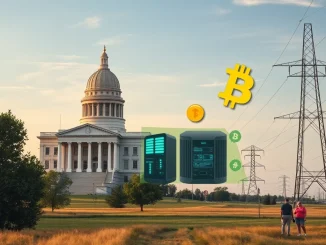
Big news from the Nordic region! Norway is looking to pump the brakes on a specific type of energy-hungry operation. If you’re involved in or following the world of cryptocurrency, you’ll want to pay attention to this development regarding Norway crypto mining.
Why the Proposed Crypto Mining Ban?
According to recent reports citing local sources, Norway’s government is planning a temporary crypto mining ban specifically targeting the construction of *new* data centers primarily intended for high-energy cryptocurrency mining. This isn’t a ban on mining itself, but rather on expanding the physical infrastructure for it.
The core reasons cited for this proposed measure are:
- High Energy Consumption: Crypto mining, particularly for Proof-of-Work cryptocurrencies like Bitcoin, requires significant amounts of electricity.
- Minimal Local Economic Impact: Compared to other industries that use data centers (like cloud computing, AI research, etc.), crypto mining operations often employ fewer people and contribute less in taxes locally relative to the power they consume.
- Prioritizing Resources: Norway wants to ensure its available electricity is prioritized for industries that offer greater overall benefit to the local economy and society.
This move highlights the ongoing global debate surrounding the environmental and economic impact of certain types of crypto operations.
What Does This Mean for Norway Data Centers?
The ban specifically targets new data centers built *for* high-energy crypto mining. This suggests that data centers serving other purposes, or existing mining operations, might not be immediately affected by the construction ban itself, though future regulations could potentially impact them.
The government’s focus appears to be on steering energy investment towards sectors deemed more productive for the Norwegian economy. This puts Norway data centers built for general computing or other high-value services in a different category than those solely dedicated to mining.
Addressing Crypto Energy Consumption
The decision directly confronts the issue of crypto energy consumption. While many in the crypto space are exploring more energy-efficient methods (like Proof-of-Stake), a large portion of mining still relies on energy-intensive Proof-of-Work algorithms. Countries like Norway, with significant hydropower resources, have historically been attractive locations for miners due to lower electricity costs, but this also puts a strain on national grids and energy planning.
This move by Norway underscores a growing trend among governments to scrutinize the energy footprint of digital asset activities.
The Timeline and Potential Impact on Bitcoin Mining Norway
The proposed ban is expected to take effect in the fall of 2025. This gives the industry some time to adapt, but it sends a clear signal about the direction Norway is heading regarding energy allocation and crypto mining.
For existing Bitcoin mining Norway operations, the immediate impact might be limited to expansion plans. However, the policy indicates a less favorable regulatory environment for energy-intensive crypto activities going forward, which could influence future investment decisions and the long-term viability of large-scale mining in the country.
Conclusion: A Signal from Norway
Norway’s planned temporary ban on new crypto mining data centers is a significant development, signaling a clear intent to prioritize energy resources for industries perceived to offer greater societal and economic returns. Expected in fall 2025, this measure directly addresses concerns about high energy consumption and the local economic contribution of large-scale mining operations. While not a ban on mining itself, it represents a regulatory hurdle for expansion and reflects a global conversation about the sustainable future of energy-intensive cryptocurrency activities. It’s a move that the crypto world, particularly those involved in mining infrastructure, will be watching closely.



